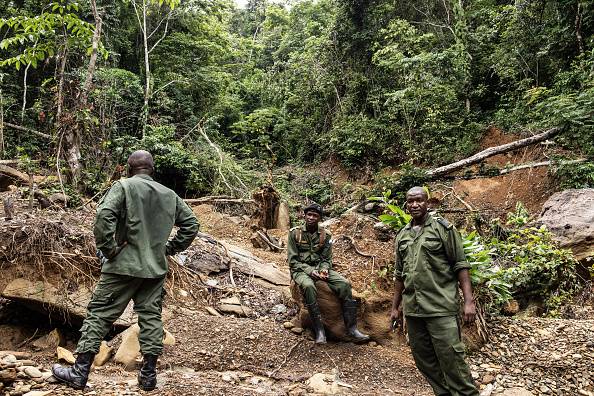
A forest ranger from the National Protected Areas Authority (NPAA) monitors a logging and illegal gold mining site inside Kambui Forest Reserve, outside Kenema, on June 14, 2024. (Photo by John Wessels/AFP)
As rain clouds gather over Sierra Leone's tropical Kambui Forest, a handful of khaki-clad forest rangers assemble for their daily patrol as part of a dwindling conservation effort in the West African country.
The team, made up of officials from the National Protected Areas Authority (NPAA), is tasked with protecting the rainforest from encroachment by illegal miners and loggers.
But with only 62 rangers managing some 14,000 hectares (35,000 acres) of land, it's a tough game of cat and mouse.
“The damage is getting worse every day,” said Sheku Jus, 36, a regional conservation officer for the NPAA.
“As we patrol the forest, we come across new areas every day where they're just starting to be active.”
Within 30 minutes of the rangers' start, Jus's words became reality: piles of sand on the riverbank indicated recent mining activity.
“This happened very recently, just an hour or two ago,” said Boccalie Kowa, 48, an NPAA regional coordinator.
“They come while we're sleeping.”
By mid-morning, temperatures were already reaching 27 degrees Celsius (80 degrees Fahrenheit) and humidity was at 96 percent, and the group faced a long trek through difficult terrain.
Kambui Hills Forest Reserve is located in the Eastern Province of Sierra Leone. The area borders Guinea and Liberia and is an area with significant reserves of gold, rutile and diamonds.
The trade in so-called “blood diamonds” helped fund the country's brutal 11-year civil war, which has left some 120,000 people dead.
But on the rocky river banks of the Kambui forest, miners are primarily prospecting for gold.
Mineral-rich Sierra Leone is one of the world's poorest countries, and forest rangers blame economic hardship for the overexploitation of the natural landscape.
Economic incentives
Along the route there were clear signs of excavation, and occasionally orange earth and stones were piled up next to the deep shafts of abandoned gold mines.
Rangers said mining has led to the uprooting of trees, which are then exploited by illegal loggers.
Midway through the patrol, the dense forest cleared away to reveal a vast area littered with fallen trees.
According to the Environmental Performance Index compiled by Yale and Columbia Universities, Sierra Leone has one of the highest deforestation rates in the world.
Since 2000, the country has lost more than 35 percent of its tree cover and 14 percent of its moist primary forests, some of the most ecologically important habitats in the world, according to online monitoring platform Global Forest Watch.
Kambui itself is home to a diverse range of mammal species, including western chimpanzees, black and white colobus monkeys, porcupines and Maxwell's duikers, a small antelope.
The lush forests are also home to endangered bird species such as the grey ruffed creeper.
Over the past 15 years, the government has stepped up its conservation efforts, establishing the NPAA in 2012 and the Ministry of Environment and Climate Change in 2018.
A diplomatic source, who asked not to be named because of his position, said Sierra Leone's environmental movement is mainly driven by economic interests, with international climate change funding supporting forest communities and ecotourism bringing a much-needed boost.
But large-scale deforestation continues due to a lack of coordination between government departments, problems with law enforcement and a lack of involvement of local people in protecting the landscape, they added.
“Let's ruin it along the way.”
Part of NPAA’s mission is to increase local communities’ understanding of the importance of protecting Sierra Leone’s rich flora and fauna.
But the unarmed rangers said interactions with people they encounter in the forest can quickly turn hostile.
“Some of them are armed – they have axes, machetes – so if you try to arrest them, they chase you,” said conservation officer Juse.
Soon after discovering the mining site along the river, the rangers arrested two young miners, who offered little resistance even when their sand-covered hands were handcuffed.
Kowa, the regional coordinator, said such cases are usually referred to police and can then lead to prison time.
Mohammed, a 23-year-old science student, said he had been mining for gold for two years but had no other choice.
“This job is really dangerous, but we have to earn money to live,” he explained.
Conservation officer Jous knew all too well how difficult it was to change mindsets in a region where abundant natural resources coexist with extreme economic hardship.
“Some of these trees are very important, but (the miners) don't know their importance,” he said.
“It gets ruined along the way.”
©Agence France-Presse

